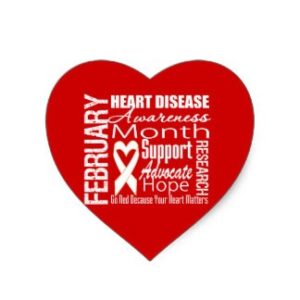We all have a special woman in our life- mom, grandma, great grandma, aunt, cousin, sister, wife, fiancée, girlfriend, daughter, step-daughter, friend, etc. We want them to be healthy, feel loved, and happy! February is Heart Disease Awareness Month and did you know that it accounts for approximately 1 in 5 deaths among women?
Let’s talk about this silent killer and ways you can help the women (and men) in your life reduce their chances of developing heart disease and some signs to look for.
The term “heart disease” refers to many types of heart conditions from heart attacks to coronary artery disease to heart failure.
Typically thought of as a disease that primarily affects men, almost as many women pass away from heart disease.
“Despite increases in awareness over the past decades, only about half (56%) of women recognize that heart disease is their number 1 killer.” -CDC
“Heart disease is the leading cause of death for women in the United States, killing 299,578 women in 2017—or about 1 in every 5 female deaths.” -CDC
Heart disease is also the leading cause of death for men in the United States, “killing 357,761 men in 2019—that’s about 1 in every 4 male deaths.” -CDC
Heart disease affects women of all races. It is the leading cause of death for African American and white women. It ties for top killer with cancer of American Indian and Alaska Native women. It’s the second killer of Hispanic and Asian or Pacific Islander women, right behind cancer.
Heart disease affects men of all races. It is the leading cause of death for men of most racial and ethnic groups in the US, including African Americans, whites, American Indians, Alaska Natives, and Hispanics. It is second to cancer for Asian American and Pacific Islander men.
What are some symptoms of heart disease?
Angina, which is dull and heavy or sharp chest pain, discomfort
Pain in the neck, jaw, or throat
Pain in the upper abdomen or back
Nausea
Vomiting
Fatigue
Sometimes symptoms can remain silent until you have a medical emergency. Here are the most common heart-related emergencies and some common symptoms.
Heart Attack: Chest pain/discomfort, upper back/neck pain, indigestion, heartburn, nausea/vomiting, extreme fatigue, upper body pain/discomfort, dizziness, shortness of breath, pain on the left side of the body
Arrhythmia: “fluttering” feelings in your chest, heart palpitations
Heart Failure: shortness of breath, fatigue, swelling of feet/ankles/legs/abdomen/neck veins
If you are experiencing any of these symptoms, please call 9-1-1 or go to your emergency room right away!
What are some risk factors of heart disease?
Hypertension
High cholesterol
Smoking
Diabetes
Overweight/Obesity
Unhealthy Diet
Physical Inactivity
Excessive alcohol consumption
How can I reduce my risk of heart disease?
Know and monitor your blood pressure
Get tested for pre-diabetes and diabetes
Stop smoking
Get your cholesterol and triglycerides checked
Make healthier food choices, and consume less junk food and fast food
Exercise
Limit alcohol consumption
Manage stress levels
If you or a loved one is exhibiting any signs of heart disease, please contact 9-1-1 or visit your emergency room ASAP! Please consult your physician for tests and more ways to reduce your risk of heart disease. As always, if you or a loved one is in need of hospice or palliative care, please call St. Anthony’s at (270) 826-2326.
Sources:
https://www.cdc.gov/heartdisease/women.htm?fbclid=IwAR37DjkfBy3o21q6-Re1EmdZuGsYlsZ6oakTZDCEq9bFE0vq8uVsih3aUjI
https://www.cdc.gov/heartdisease/men.htm
